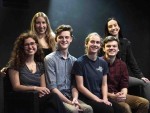On Feb. 14, 2018, 17 students lost their unalienable right to life.
In partnership with NewYorkRep, the UCLA School of Theater, Film and Television will host a production of “Church & State” in Macgowan Hall on Thursday, the one-year anniversary of the shooting at Marjory Stoneman Douglas High School in Parkland, Florida. The play follows the aftermath of a fictitious school shooting as those affected question both their religious beliefs and their stances on gun control. Fourth-year theater student and director Anna Mader said even though the show advocates for gun restrictions, she hopes the production will facilitate a bipartisan discussion on gun control and the multiple issues entangled with it.
“It’s a play about gun reform, but also a play about redemption and not being afraid to change your mind and say that you’re wrong,” Mader said. “Its main message is that our first human right should be safety.”
The production focuses on Senator Charles “Charlie” Whitmore, played by second-year theater student Carl Ballantine, who is promoting his congressional platform by fusing religion and politics in a small North Carolina town. After a shooting occurs at his children’s school, Whitmore must contend with his loss of faith in God, Mader said. Such personal and political conflicts are further amplified by his tense discussions with Alex Klein, his liberal campaign manager, played by second-year theater student Beatrice Brown.
The narrative highlights the tension between liberals and conservatives, which can best be seen between Whitmore and Klein’s complex relationship, Ballantine said. By featuring a multitude of conflicting political views, Ballantine said they hope to emphasize that people can have beliefs separate from their political party, namely supporting increased gun control while being Republican.
“I hope this role encourages people who are conservative or Republican not to fit a mold,” Ballantine said.
Similarly, Mader said she sees the play as a chance to remind conservatives and liberals alike that people’s opinions are not static. She hopes that the production can help audiences realize that strictly subscribing to the ideals of one group is limiting.
Their collaboration with NewYorkRep is another aspect that aided their desire to present gun control as an issue that can encourage a conversation between parties rather than divide them, said Emma Wenkert, a third-year theater student and the play’s producer. The organization reached out to the chair of UCLA’s theater department as well as eight other universities to host readings of “Church & State,” Wenkert said.
By staging the production across the nation, Mader said they will emphasize how the issue crosses state lines – an issue Mader herself connects with, having moved to a liberal state from a conservative one. Looking back at her home town, Mader said she can only hope they can break out of the Republican mold and develop their own opinions on the issue of gun control.
“My home state, Tennessee, is very, very conservative right now, so I’ve seen a lot of these issues play out,” Mader said. “It’s really hard for me to believe that the people I grew up with are incapable of change.”
As she approached directing the production, Mader said she was unable to separate her own biases in favor of gun control, as was fitting, for the play presents the same bias. On a different note, as the play was written before the Parkland shooting, Mader said she did not want to alter it to more specifically reference the anniversary, but audiences will still be able to draw comparisons between the call for gun restrictions that emerges from both the production and the aftermath of Parkland.
To further the conversation on gun control across parties and to continue the commemoration of Marjory Stoneman Douglas, Wenkert said there will be a panel featuring representatives from the Brady Campaign and a Los Angeles organization, Women Against Gun Violence. Mader said she hopes the panel will provide a more literal space for conservatives and liberals to talk alongside each other about gun violence and the play’s central question on whether or not religion should play a part in politics.
“It’s meant to be a play that unites parties,” Mader said “I hope that this play inspires people to think about change and making the world safer, because fear is bipartisan.”
